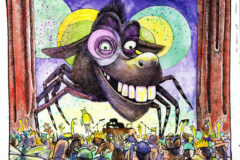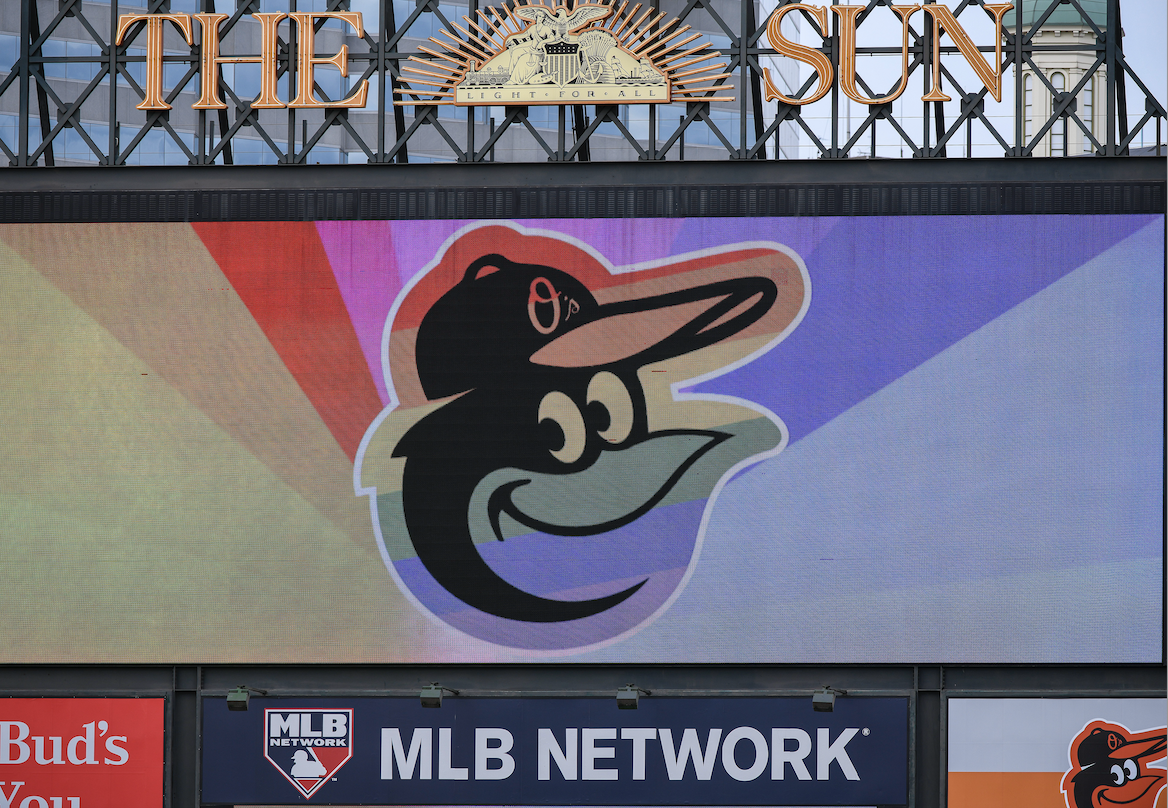Welcome to The Luxury Gap, a suite of madcap cultural investigations about art, class, and economics written by the last punk rocker without a trust fund.
It’s Baltimore Pride. The streets are bejeweled with palm tree muscle shirts, purple cowboy hats fashioned with rainbow bandanas, and a good share of people dressed like it’s any other Tuesday. My partner drops me off and I make my way towards the noise.
Just hours ago, Roe v. Wade disintegrated before our very eyes. Yet here we are. The crowd is thick between myself and the main stage where I’ve come to catch DDM, one-third ’80s superhero, one-third Biggie Smalls, and one-third that friend you loved to talk shit with in high school. They’re starting in minutes but I’m still pretty damn far from the stage. I want to get at least one photo that doesn’t look like I’m watching from the North Pole.
My instinct is to find an alley and cut past the crowd. I’m three blocks from where I want to be, in a bottleneck, which is to say, in a cloud of random cologne and billowing indica minced with tobacco. Most people steer clear of alleys. Though a well-traveled balladeer knows better.
I’ve spent the last two decades of my life crisscrossing the U.S. and Europe in a band. I’ve played field days, street fairs, German squat houses, legal roof tops, illegal roof tops, basements of all scopes and shades, and even a thing called Beef Stock. So I’m fairly confident I’ve experienced every possible structural permutation of human bodies. You must learn the hacks to survive out there or you will find yourself like a lost snake-baby in the serengeti, ending the weekend as a dry, resentful husk sipping pedialyte in Marfa, Texas.

Also Read
Through The Ogre’s Mouth, Darkly
As I roam toward the alley like Alexander Sokurov in Russian Ark, I notice a subset of hesitant touristy-looking Pride-goers who consider following me. They’re wearing polo shirts and the uneasy expressions of interlopers who spent the morning pregaming at the Radisson on imitation orange juice and cryogenically frozen blueberry muffins.
After wading through countless cities submerged in Red Bull banners and sunburnt weekenders spiking the Airbnb rates, I’ve grown a bit resentful of these types of people and the whole music festival economy. To me, festivals are just a mechanism of nefarious parking schemes and some idiot who made Forbes’ 30 Under 30 paying as little as they can to work-a-day musicians on the lower tiers (like this crazy gal.) At least the water fountains are free.
I remember seeing bottles of water going for five dollars a pop at WoodStock ’99. I lived in Utica at the time, about ten miles from Rome, New York, where it was held, so it wasn’t hard to hitch a ride and sneak in. Bored by Limp Bizkit and a bit spooked by a five-story MTV camera tower that had come untethered, I made my way back out the hole in the fence from whence I came and hopped on some random school bus shuttling folks back and forth to crowded hotels. I got off at Denny’s to escape the madness and indulge in bottomless cups of bad coffee.

Music festivals are the creations of people with unhealthily low levels of pessimism. Then they find themselves knee-deep in fence rental companies, permits, and the unforeseen dislocated shoulder. Next thing you know you’re saying “we need sponsors or we’re fucked.” That’s when the beer companies and ticket huxters come sniffing around. If you got numbers they want you. No matter how slick that Taurine Energy Drinks rep is, know this: they’re all in it for the money, not the music or any highfalutin idea of utopian unity.
Don’t let the affected Pablo Escobar mustache fool you. Most people are dropping into town for what they think is a little mindless delirium, only to have every moment taxed by some corporation. They max out three cards then it’s back to whatever hellscape they’ve carved out for themselves in middle management. Only Billie Eilish wins.
The alley is the poor man’s DeLorean. For the minor inconvenience of crunching your feet down on a bit of old drug paraphernalia and dodging a few rats, you walk straight through the proverbial North West Passage, warping past about a thousand or so hungry customers waiting for overpriced funnel cake and kebab. Which is tempting enough as I have not eaten much today.
What you don’t want to do is follow the crowd. As a performer at festivals similar to this one, I’ve witnessed many failed attempts at establishing crowd hierarchy from suburbanites setting up camp five hours before an event. They festoon their territory with coolers and grimacing Guy Fieri-types until they’re elbowed into a corner where all they can see is a telephone pole and the back of some aging hipster’s balding head. All that effort only to hear poorly mixed guitars and flat vocals that sound like they’re emanating from a crushed Dixie cup.
My main advice for music festivals is that you want to be mobile and hydrated. If you want to sit, then just sit in your apartment. I always keep a jar of peanuts in my bookbag because if you’re not playing you’re paying. Many a festival, I’ve earned fifty bucks after costs only to lose it the next day on gyros and Mezcalitas in a stoned frenzy. This day finds me off guard, without my usual cup of three-hours-old coffee, which I regretfully left in the cup holder of the Outback, where my partner is currently searching for a parking space while I selfishly absorb this lovely kaleidoscope of chaos.
In a city like Baltimore, where you usually see the same five people at every show, I’m surprised I have yet to recognize a single face so far. It’s oddly nice. The scattershot turntable sounds bouncing off the brick-and-mortar buildings feel more inviting than noise shows where everyone pretends not to see each other. Festivals can often feel cold and impersonal, like Black Friday sans the doorbusters. (For my money I’d rather catch an O’s game and cough up ten dollars for a lukewarm Heineken than go to most big festivals.) But as I edge closer to the stage, a random person in a mammoth green sombrero walking by gives me a wave and a deep smile like we’re old chums at a barbeque and my faith in humanity is restored.
I end up in front of WYPR headquarters, our local NPR station here in Baltimore, a lovely place that I’ve pissed off plenty of times but we’ll save that for another day. As I wedge between fellow citizens and a Bijon from New Jersey, a woman waves and points at the ground helping me to dodge a pile of vomit, which I end up stepping in anyway. After all this, I miraculously find myself about as close to the front as one can hope to get after doddering around half the day with my makeup, which is somehow melting off my face despite copious application of setting powder. My partner waves and we stand on the curb together, just in time.
Legendary Baltimore rapper DDM (Emmanuel Williams), takes the stage in a Pacman-themed ensemble and kicks off with “He Say She Say,” his 2019 jam calling out imposters, naysayers, trolls of various natures. Even Amy Schumer seems to have pissed off DDM, though over what I don’t quite know. He manages to wrangle at least half the crowd into a bit of call-and-response, proclaiming to the semi-distracted mass, “I think that’s pretty fuckin’ simple right?”
DDM is accompanied by DJ and MC Kotic Couture and a group of diverse dancers of varying age, race, and gender, reflecting the eclectic audience that he’s managed to garner over the years through constant public appearances within the realm of art spaces and night clubs locally and nationwide. Manny, who I’ve interviewed and broken bread with on multiple occasions, strikes you as savvy and determined enough to break through. In addition to countless colorful earworms he has honed a strong social media acumen that captured national attention when he made a video series dissecting Omarosa Newman’s Unhinged: The Omarosa Story.
Three songs in, Manny has the sun-dazed audience chuckling and singing along, as he always does. For a moment, the gimmicks of the day slipped away and something snapped inside me. I wasn’t alone. In a city that has faced so much adversity and division, I felt the city take a breath. Here as one.
Some of us are recently out. Others are farther along that path. And many stand in solidarity.
At no point in the day did I get a wise-ass grin or silence that surrounds you like cold seawater as a couple passes having obviously just shared a snide comment about your jeans or your hair, because Heaven forbid you should feel okay for one goddamn day.
Today, though, the bastards do not win.
As pink clouds beckon the night, I think about how this day belongs to us. Manny heralds the moon ascending over Charles Street in our fair city, smiling cheek to cheek.
Ed Schrader is a writer and musician based in Baltimore. They are the lead singer of Ed Schrader’s Music Beat and the host of the comedy podcast, Coffee With Ed. Read Schrader’s last column on gentrification and Heaven 17 here.




